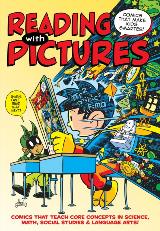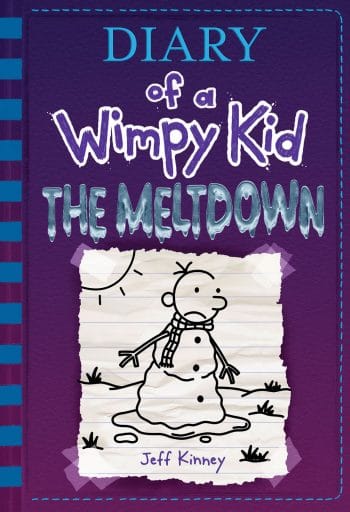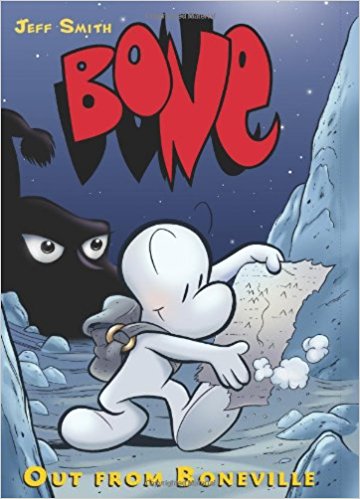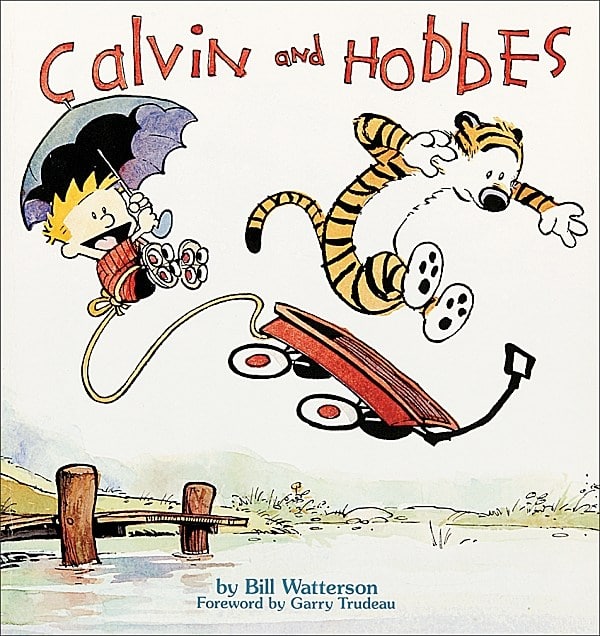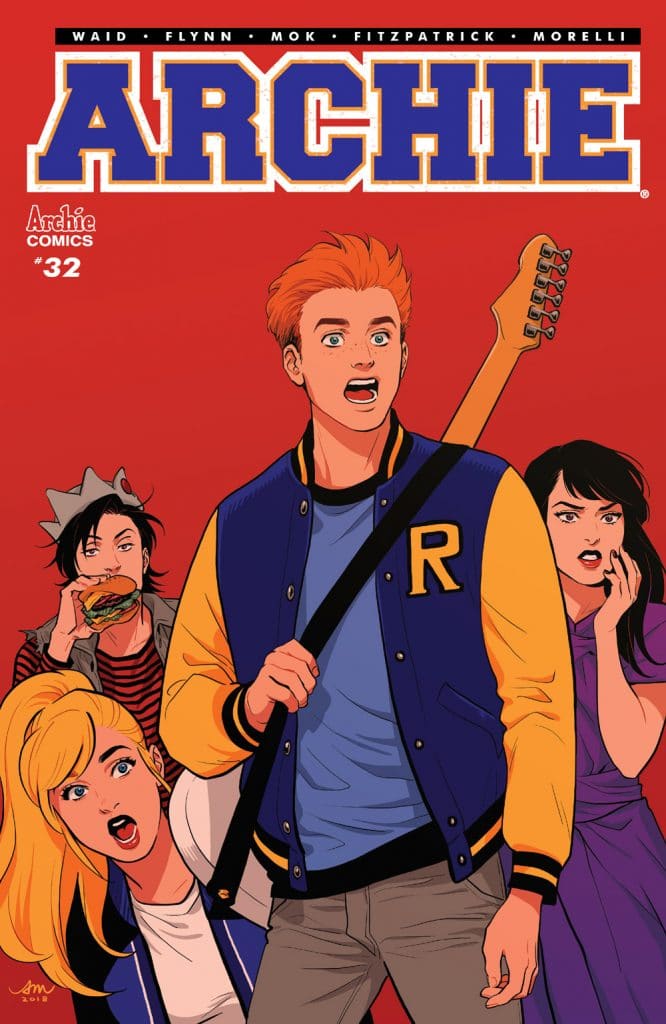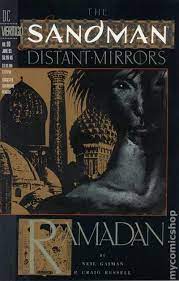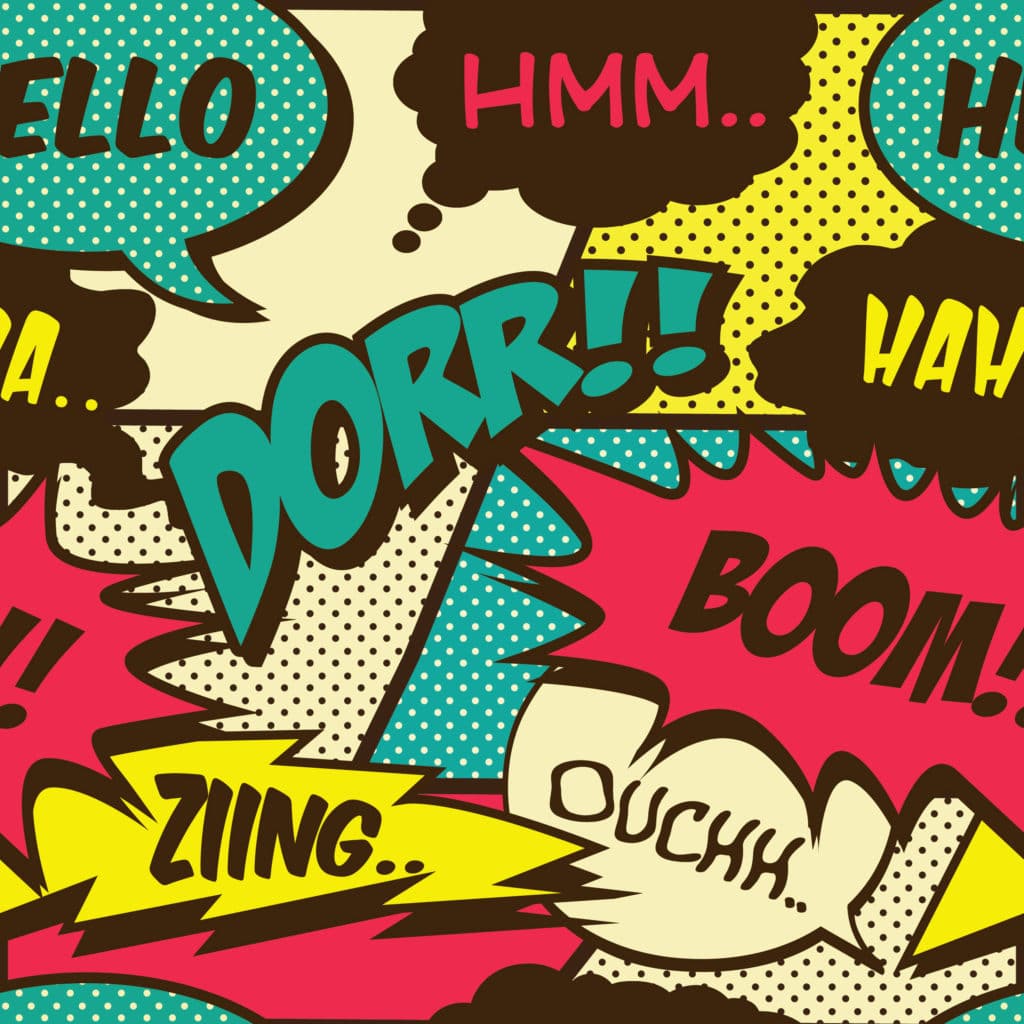
19 Exciting English Comic Books to Learn English
Comics can be a great way to learn English.
The pictures in the comics help you understand the story and context. The words give you the dialogue and details.
In this post, I’ll show you the best comic books English learners can use to improve their language skills while enjoying incredible stories.
Contents
- 1. “Reading with Pictures: Comics That Make Kids Smarter”
- 2. “Sketch Monsters: Escape of the Scribbles”
- 3. “Diary of a Wimpy Kid”
- 4. “Bone”
- 5. “Calvin and Hobbes”
- 6. “Archie”
- 7. “Garfield”
- 8. “Shen Comix”
- 9. “Peanuts”
- 10. “Maus”
- 11. “Spider-Man”
- 12. “Watchmen”
- 13. “The Sandman”
- 14. “Fables”
- 15. “Romantically Apocalyptic”
- 16. “Batman”
- 17. “Superman”
- 18. “X-Men”
- 19. “Ms. Marvel”
- And One More Thing...
Download: This blog post is available as a convenient and portable PDF that you can take anywhere. Click here to get a copy. (Download)
1. “Reading with Pictures: Comics That Make Kids Smarter”
Level: Beginner
Genre: Education
For a very long time, comic books were thought of as the opposite of educational. But now, more and more educators are realizing the power of comic books for learning.
This book is specifically made for beginner readers in English. It includes more than 12 short stories. The topics include American presidents, science, history and even fiction.
The stories are short and very easy to read. This is a perfect introduction to comic books for beginners. As the stories are made for American classrooms, learners can also get to know the basics of American history and society.
2. “Sketch Monsters: Escape of the Scribbles”
Level: Beginner
Genre: Fantasy
This is a story about Mandy, who doesn’t share her feelings with anyone. Instead, she draws them on a notebook as monsters.
One day, she discovers that all those monsters have escaped from her notebook into the real world and she has to capture them all back.
This is a good and short book to learn basic English vocabulary about emotions and feelings. The book is also great for learning the names of the objects found in schools and homes.
3. “Diary of a Wimpy Kid”
Level: Beginner
Genre: Comedy
This book series is more heavy on text as compared to the other comic series so it’s best for those that prefer more English reading practice.
The story is about a kid named Greg Heffley and his various problems. Each book’s story revolves around one major problem in Greg’s life including financial, family and social issues.
The book series is quite useful for anyone who wants to learn about the culture of growing up in the English-speaking world.
The conversations between the characters are easy to follow and natural. Pair this one with authentic English content like the videos on FluentU to maximize your learning.
FluentU takes authentic videos—like music videos, movie trailers, news and inspiring talks—and turns them into personalized language learning lessons.
You can try FluentU for free for 2 weeks. Check out the website or download the iOS app or Android app.
P.S. Click here to take advantage of our current sale! (Expires at the end of this month.)

4. “Bone”
Level: Beginner to intermediate
Genre: Comedy, fantasy
This comic series follows the “Bone” cousins as they get lost when exploring a forest.
They then embark on an epic adventure that includes fighting the “Lord of Locusts” as he tries to destroy the Valley of creatures.
This comic book is unique, funny and has many elements of the fantasy genre. Learners will find it really easy to read.
The comic does have some slightly historical themes that can contribute more to educational elements of this book.
5. “Calvin and Hobbes”
Level: Beginner to intermediate
Genre: Comedy
This comic started in the late 1980s but it continues to be relevant to readers even today.
The comic tells the story of a young kid named Calvin who always plays with his imaginary tiger friend, Hobbes.
They often go on adventures together, talk about the adult world and try to solve each other’s problems.
The series is great for learning about the vocabulary used during play and also about the everyday culture in the U.S.
6. “Archie”
Level: Intermediate
Genre: Romantic-comedy
This comic series is often seen as a symbol of American culture.
The series is set in a small town called Riverdale. Archie is the teenage protagonist of the series, but his high school friends are equally important for the stories.
Betty and Veronica are his two closest friends who also want to date him. The main plot of the series revolves around their love triangle (when two people like the same person).
This comic explains the social structure of a high school very well and demonstrates a lot of casual language.
7. “Garfield”
Level: Intermediate
Genre: Humor
The orange cat called Garfield is known by almost all Americans.
This series follows the everyday life of this lazy cat, his owner Jon and a dog called Odie.
The comics are very casual, often talking about the eating habits of Garfield and his hatred for Mondays and diets. This comic is great for readers who don’t want to deal with complex issues and just want to focus on the language.
Readers can use “Garfield” to learn more about what is socially acceptable in America as well as more informal English.
8. “Shen Comix”
Level: Intermediate
Genre: Comedy, motivation
“Shen Comix” is a web comic that has taken the English world by storm and you’ve likely seen a meme or two from this comic strip.
The comic doesn’t totally have a story, but is rather more like an online blog in the form of a comic. The author bases the strips on his own life.
The topics of the comics can be varied from comedic strips to more motivational comics. The creator also often answers questions from readers with his comics.
This one is great for intermediate reading practice and interacting with a very involved reader’s community!
9. “Peanuts”
Genre: Comedy
This comic strip ran from the year 1950 to 2000 and has readers from all around the world.
The story centers on Charlie Brown, his group of friends and his dog Snoopy. He’s a persistent and determined boy who keeps failing at various things but never gives up.
The stories deal with a wide range of topics such as friendship and love. The comic strips are very short and perfect for simple reading practice.
10. “Maus”
Level: Advanced
Genre: Historical
This graphic novel (a long story in a comic book format) tries to capture the experiences of the people who survived the trauma of the Holocaust.
The author, Art Spiegelman, tells the story of his father, a survivor of the Holocaust. All the victims of the Nazis are shown as mice and the Nazis themselves are cats. All the events shown in the comic are real.
The historical background alone makes “Maus” a must for English learners, as it teaches you both about history and natural but not too casual English.
11. “Spider-Man”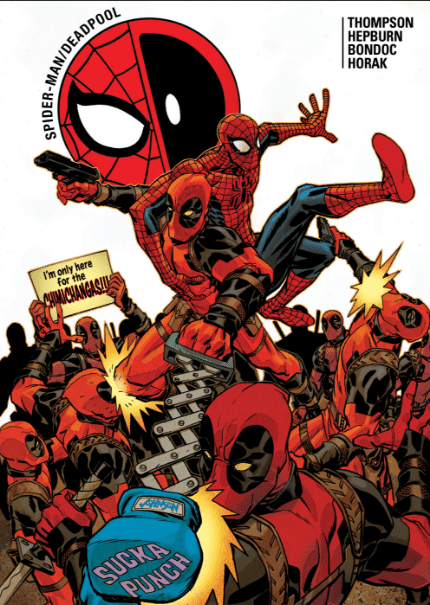
Level: Advanced
Genre: Action
You’ve probably at least heard of Spider-Man if not seen the movies or read the comic books. He’s one of the most famous superheroes in the world along with characters like Batman or Superman.
Spider-Man is a young superhero who gets special abilities after being bitten by a radioactive spider. The series then follows Spider-Man through his fights against crime and evil in New York City.
Through this comic you can learn a lot about American high schools and the vocabulary used by teens in the U.S. as well as typical vocabulary surrounding crime and justice.
12. “Watchmen”
Genre: Action, mystery
This comic is set in the Cold War era featuring a group of ex-superheroes. The story is a murder mystery where the deaths of various Watchmen members are investigated.
The story is really an analysis of American society as a whole as it existed in the 1980s. Although the historical events are slightly altered, the comic represents America very realistically.
Through this comic, you’ll learn different versions of American English as some characters use a lot of slang where others speak very formally.
13. “The Sandman”
Genre: Fantasy
Like all the other superhero comics, the main character has special powers. But unlike the other superheroes, Sandman is closer to a god rather than a human with powers.
Sandman controls the world of imagination and dreams.
The comic is a very long collection of stories that cover a wide range of topics from mythology to literature to fantasy.
This series is great for reading practice and learning about various cultures from around the world. The sheer diversity included in this series makes it very relatable for most readers.
14. “Fables”
Genre: Fantasy
The word fable refers to fictional stories that often have a moral message and are traditionally passed from one generation to another.
In the world of this comic, the characters of well-known fables and fairy tales are forced to run away from their home due to an enemy called the “Adversary.”
The fables live in a secret place within New York City and face conflicts such as trying to hide in the human world or fighting with the Adversary.
For this comic, you will need advanced reading skills to understand. Most of the stories deal with life in America and use American English.
15. “Romantically Apocalyptic”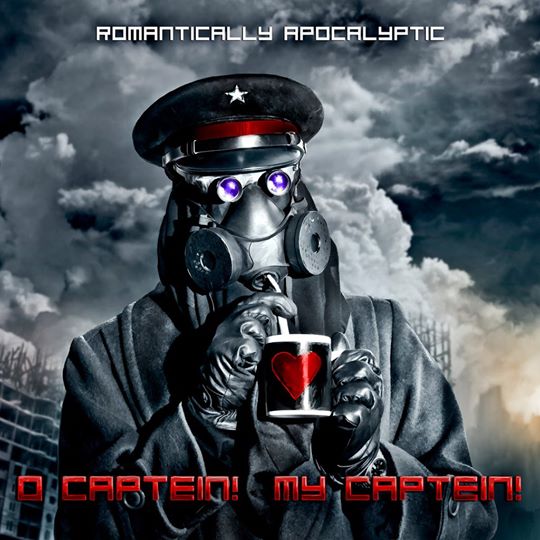
Level: Advanced
Genre: Dystopian, comedy
This comic takes place in a world that has already been destroyed. Like Shen Comix, this is a webcomic that’s immensely popular on the internet.
The main character, Pilot, finds himself in a destroyed city and joins a group of crazy people lead by a person called Captain. The events that take place are often rather comedic and demonstrate English humor.
The comic is a great learning resource as you will not only get reading practice, but conversation and listening practice through the interactive community and provided audio recordings.
16. “Batman”
Level: Advanced
Genre: Action
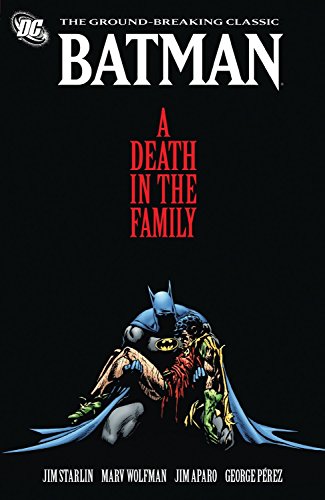 Batman is one of the most popular comic characters and was created by DC comics. The comic features a wide variety of villains, which are just as famous as Batman himself.
Batman is one of the most popular comic characters and was created by DC comics. The comic features a wide variety of villains, which are just as famous as Batman himself.
Batman doesn’t have any superpowers, but he is a master of martial arts and extremely wealthy, so he makes special weapons, cars and other gadgets that help him fight evil.
Newer Batman comics are for older readers and involve crime fighting and questions about justice. This makes them a great resource for exploring more difficult concepts and vocabulary surrounding justice.
17. “Superman”
Level: Intermediate to advanced
Genre: Action
 Superman is another DC series that started in 1938 and is one of the most famous superhero comics there is.
Superman is another DC series that started in 1938 and is one of the most famous superhero comics there is.
Superman has superpowers like invincibility, super strength, X-ray vision and flying. While Superman fights crime and is also a reporter for a newspaper, these comics are more like science fiction than Batman.
Most Superman comics are for all ages, which makes them suitable for most levels of English learners as well.
18. “X-Men”
Level: Advanced
Genre: Action
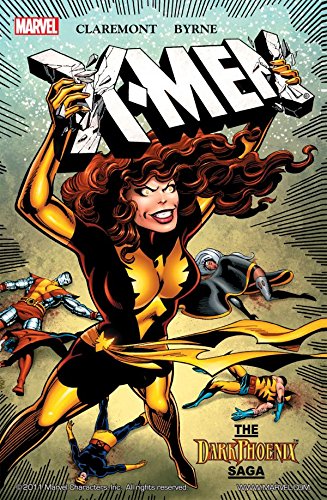 X-Men is a series from Marvel Comics about a world that has people with special abilities and superpowers who are called “mutants.”
X-Men is a series from Marvel Comics about a world that has people with special abilities and superpowers who are called “mutants.”
Some can heal themselves, fly, control the weather, create ice or change their appearance whenever they want to. These mutants face a fight against the main villain Magneto but also struggle to blend in with the non-mutants.
This series is very exciting and has plenty of cool superheroes, but it also draws attention to social and political issues that reflect those that we see in the real world.
This makes the language a bit more complex, but great for those that want something beyond powers and fighting.
19. “Ms. Marvel”
Level: Advanced
Genre: Action, Science Fiction
 Ms. Marvel is a Marvel Comics character with various secret identities and powers that include super strength and flying.
Ms. Marvel is a Marvel Comics character with various secret identities and powers that include super strength and flying.
Ms. Marvel comics tend to be more of a science fiction read that also contains serious themes, making them more suitable for older readers.
While the series can reflect on serious issues, the action of the comic is exciting and sure to keep you engaged.
You will learn a great deal of vocabulary from this series, especially when it comes to things relating to science.
The next time you need a break from boring lessons, just find a comfortable chair and sit down with one of these comic books to make your learning journey an adventure!
Download: This blog post is available as a convenient and portable PDF that you can take anywhere. Click here to get a copy. (Download)
And One More Thing...
If you like learning English through movies and online media, you should also check out FluentU. FluentU lets you learn English from popular talk shows, catchy music videos and funny commercials, as you can see here:
The FluentU app and website makes it really easy to watch English videos. There are captions that are interactive. That means you can tap on any word to see an image, definition, and useful examples.
For example, when you tap on the word "searching," you see this:
Learn all the vocabulary in any video with quizzes. Swipe left or right to see more examples for the word you’re learning.

FluentU helps you learn fast with useful questions and multiple examples. Learn more.
The best part? FluentU remembers the vocabulary that you’re learning. It gives you extra practice with difficult words—and reminds you when it’s time to review what you’ve learned. You have a truly personalized experience.
Start using the FluentU website on your computer or tablet or, better yet, download the FluentU app from the iTunes or Google Play store. Click here to take advantage of our current sale! (Expires at the end of this month.)
